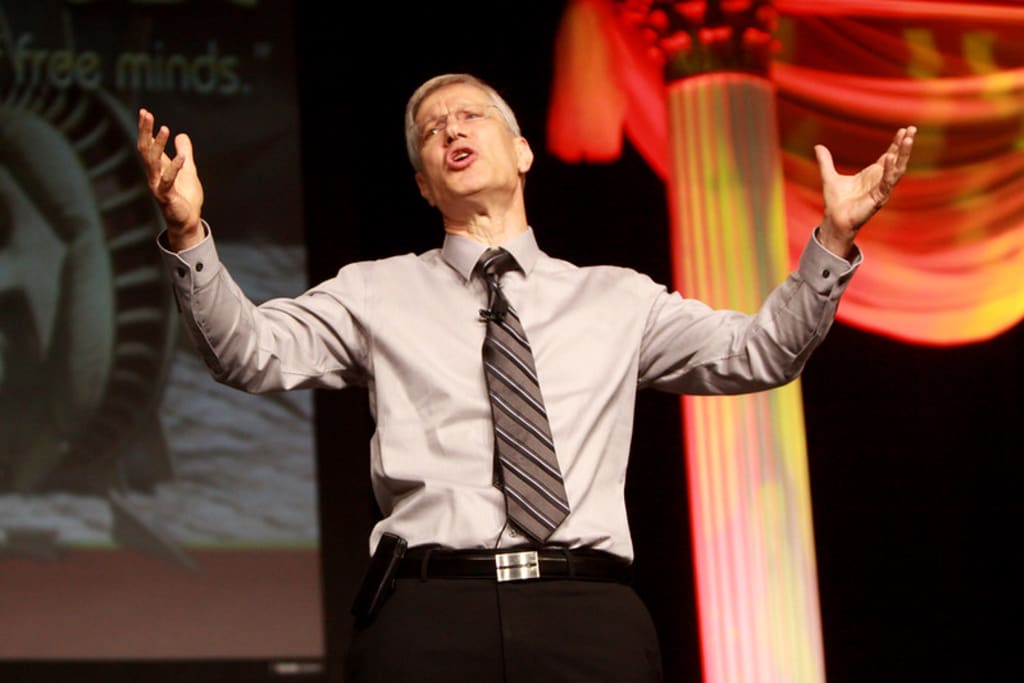"Talking Brook: 'Yaron Brook Show: Movie Hombre & Christian Morality'"
How does Dr. Brook view one of the prevailing religions in the world?

Dr. Brook plows through the beginning of the show talking about the film Hombre (1967), which he finds to be an anti-Western. He says that most people miss the point of the movie. He points out that Native Americans have been mistreated. The entire movie revolves around the Paul Newman character, John “Hombre” Russell. Dr. Brook discusses plot points and lauds Newman’s acting and the direction. He proclaims that Russell has a strong sense of morals. Hombre, Dr. Brook explains, compromises on important issues. “Christianity is mentioned once but implied throughout the movie,” Dr. Brook says.
He shows how the Hombre character is self-interested and a man of justice. There’s no “full-blown Randian conception of selfishness,” but the film demonstrates some instances of rational egoism. The crook in the film has his hands in the air, but Hombre still wants to shoot him, because he’s a bad guy. One should never make a fair fight with a vicious person, Dr. Brook admonishes. When life is at stake, it is imperative that the enemy ought to be eliminated. Hombre shoots the bad guy, but doesn’t kill him. While Dr. Brook details the events of the film, he drops little philosophical bits to enhance the understanding of Miss Rand’s ideology.
Hombre exposes the men as hypocrites. With all those who have poor virtues around him against a woman who stands for Christianity, he frees the woman and then throws the bag to the crook. Ultimately, Hombre is killed for sacrifice. The ideals of pity, and a sense of being pathetic is inherent in the film. Hombre lacks a radical alternative to the negative morality. With Dr. Brook’s analysis of the film, it shows how he is able to navigate through pieces of art and extract the underlying meaning of such work.
Dr. Brook says that choices are the cornerstone of virtue. The free will that is involved permits the individual to live a full life. Hombre doesn’t depict this towards the end. It shows “pity, compassion, and charity at the expense of the good for being good,” which means that Hombre must fall.
Within the Christian mythology, it is permissible to accept duty and sacrifice as moral ideals. The notions of charity and compassion are so imbedded in the culture, that Dr. Brook says that the sacrifice of the good is incompatible with “trade, with making money.” He allows that in The Ten Commandments there’s some sense of private rights, but they don’t explicitly express a clear, cohesive, consistent viewpoint. “The first four Commandments have nothing to do with morality but with obedience,” Dr. Brook illustrates. He mentions how its okay for Moses and Aaron to slaughter thousands of people, but it’s not okay to kill according to the Commandments. There’s no freedom of religion or life, liberty, property, and the pursuit of happiness. Moses and his brother doesn’t sit down and discuss diplomatically the nature of how people should be free to choose whatever ideas that they wish within reason. They just picked up swords and mow down folks. Dr. Brook points out that images should not be made. He explains how some Jews don’t even have sculptures and paintings in their homes. Dr. Brook calls the Spirit “completely self-centered.”
Dr. Brook distinguishes objective reality from subjectivism. He holds that most of what we have today is overwhelmingly feeling and emotion. He questions what Christian morality is about. It begins with loving your neighbor as yourself. The example is the Samaritan who experienced an assault. Honesty should be understood as not accepting falsehoods. By putting emotion above fact, it is difficult for some men to know honesty. “What’s really noble in Christianity is sacrifice...and selflessness,” asserts Dr. Brook.
There’s “no mention about productiveness or the virtues that make capitalism possible,” Dr. Brook holds. Selfishness is looked upon as a detriment and something evil to Christians. Dr. Brook describes how sacrifice is used as a “package deal.”
What it truly means is to give up good or great values for lesser or non-values. Why is this? Dr. Brook offers no answer because there is no earthly, rational explanation. It’s subjective because there are immoral and bad things that go into decisions that people make, Dr. explains. Dr. Brook is against most charity because people refuse to give to a worthy cause, but complete their “duty” and to “appease guilt.”
You can’t love your neighbor above yourself because it takes the hierarchy of values that prevent an individual from fully loving other people that are lower on the rungs. Christianity must lead to sacrifice because of the nonexistence of an afterlife, Dr. Brook portends. He shows that it’s not a sacrifice or altruism to love your neighbors if they are worthy of that love. The good doctor then returns to the ideas of Westerns and how there is a sense of immorality involved in “Spaghetti Westerns.” He finds that the protagonists are “cold, detached, and removed” from the sense of a standard of morality. These films are “amoral on purpose” and good Westerns feature virtuous leads who project a system of values. Dr. Brook proclaims that the best Westerns came out of the 1940s and early 50s.
Dr. Brook declares that he is not responsible for the discrimination and atrocities of the past and that the government should apologize early in the stages. He understands why people want compensation. He talks about the Jim Crow laws and how, up until the 1960s, blacks lacked rights and the ability to capitalize on the opportunities present to other people. Yet he says that none of that was his fault nor anyone who supported the Civil Rights movement.
The talk then turns to Atlas Shrugged (1957). Dr. Brook speaks on the idea that Rearden is a “jerk” in the book, but it’s actually the monsters surrounding him including his wife and mother and brother who are the real “jerks.” The best thing that Rearden does is kick out his family, which is deeply virtuous. As a given, you are not obligated to “honor thy mother and father.” If they are good, you should respond to their virtuousness by treating them well. But if they’re evil, they deserve no respect or love.
Dr. Brook says that it doesn’t matter what you study, philosophy and art arm your consciousness and replenish your soul, respectively. Within the field of economics, poor examples of philosophy crop up often. Philosophy is about life. Dr. Brook puts out the ideas of how to handle emotions, money, virtues. Art gives you the fuel to live, according to Dr. Brook. He reminds his audience that everyone has some version of a philosophy. Art is a crucial aspect of human life to Dr. Brook. He calls it a “necessary feature of being human.” All people experience art in some way or another. There is a distinction between life-affirming, moral, and soul-stirring art and a dumbed-down, anti-conceptual, anti-life sensibility.
Dirty Harry movies, to Dr. Brook, show the results of a decaying culture. Yet, Dr. Brook enjoys the films for their thoughts on justice. Dr. Brook then fields another questioner who asks whether Objectivism is like arithmetic or an opinion. He shows that Objectivism doesn’t cover all truths and it is based on facts, reality, thought, and reason that is much harder and more abstract than arithmetic and even calculus. It is a theory that involves the individual finding what is as true as 1+1=2. The whole body of work is not “the truth.” What we should all be are truth-seekers. Dr. Brook says that you should be able to take an abstract point and illustrate how it performs in reality.
The Spy receives praise from Dr. Brook and he lets his audience know of his upcoming shows. The listeners and viewers anticipate a new episode like a wolf craves a steak.
About the Creator
Skyler Saunders
Cash App: $SkylerSaunders1
PayPal: paypal.me/SkylerSaunders
Join Skyler’s 100 Club by contributing $100 a month to the page. Thank you!






Comments
There are no comments for this story
Be the first to respond and start the conversation.